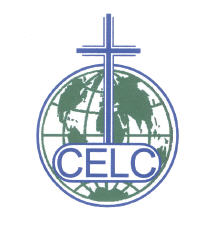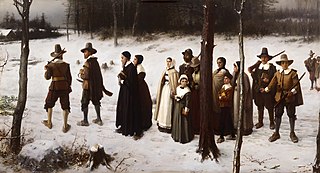Related Research Articles

The Lutheran Church—Missouri Synod (LCMS), also known as the Missouri Synod, is a traditional, confessional Lutheran denomination in the United States. With slightly under 2 million members, it is the second-largest Lutheran body in the United States. The LCMS was organized in 1847 at a meeting in Chicago, Illinois, as the German Evangelical Lutheran Synod of Missouri, Ohio, and Other States, a name which partially reflected the geographic locations of the founding congregations.
The Evangelical Lutheran Church in America (ELCA) is a mainline Protestant Lutheran church headquartered in Chicago, Illinois. The ELCA was officially formed on January 1, 1988, by the merging of three Lutheran church bodies. As of 2019, it has approximately 3.3 million baptized members in 8,972 congregations.

The Wisconsin Evangelical Lutheran Synod (WELS), also referred to simply as the Wisconsin Synod, is an American Confessional Lutheran denomination of Christianity. Characterized as theologically conservative, it was founded in 1850 in Milwaukee, Wisconsin.

The Church of the Lutheran Confession (CLC) is a conservative Christian religious body theologically adhering to confessional Lutheran doctrine. Founded in 1960 in Minnesota, it has approximately 85 congregations in 24 U.S. states, and missions in Canada, India, Africa, Nepal, and Myanmar.

The Confessional Evangelical Lutheran Conference (CELC) is an international conference of Confessional Lutheran national churches. The CELC is headquartered in Mankato, Minnesota.

The Evangelical Lutheran Synod (ELS) is a US-based Protestant Christian denomination based in Mankato, Minnesota. It describes itself as a conservative, Confessional Lutheran body. The ELS has 130 congregations and has missions in Peru, Chile, India, South Korea, Ukraine, Czech Republic, and Latvia.

Confessional Lutheranism is a name used by Lutherans to designate those who believe in the doctrines taught in the Book of Concord of 1580 in their entirety. Confessional Lutherans maintain that faithfulness to the Book of Concord which is a summary of the teachings found in Scripture, requires attention to how that faith is actually being preached, taught, and put into practice. Confessional Lutherans believe that this is a vital part of their identity as Lutherans.
Evangelical Lutherans in Mission (ELIM) was a liberal caucus within the Lutheran Church–Missouri Synod (LCMS). It was formed in 1973 as an oppositional group of clergy following sweeping victories by Jacob Aall Ottesen Preus II and the LCMS's conservative wing, known as Confessional Lutherans, at the synod's 1973 convention in New Orleans. It was not considered a major issue in the LCMS when it began because it originally lacked significant lay support. ELIM gained further momentum in the wake of the 1974 Seminex controversy at Concordia Seminary in St. Louis, Missouri. The organization dedicated a large portion of its resources to supporting the break-away Seminex institution. Only after the Seminex controversy did ELIM begin to gain lay support. However, immediately after the Seminex controversy both the Confessional Lutherans and the ELIM claimed they did not want a schism. But after Preus was easily reelected as president of the LCMS in 1976 ELIM decided to become a confessing movement within the LCMS.

The Evangelical Lutheran Synodical Conference of North America, often known simply as the Synodical Conference, was an association of Lutheran synods that professed a complete adherence to the Lutheran Confessions and doctrinal unity with each other. Founded in 1872, its membership fluctuated as various synods joined and left it. Due to doctrinal disagreements with the Lutheran Church–Missouri Synod (LCMS), the Evangelical Lutheran Synod (ELS) and the Wisconsin Evangelical Lutheran Synod (WELS) left the conference in 1963. It was dissolved in 1967 and the other remaining member, the Synod of Evangelical Lutheran Churches, merged into the LCMS in 1971.

The Evangelical Lutheran Church "Concord" is a small confessional Lutheran denomination based in Russia. Established in 1992, it is a mission denomination assisted by missionaries supported by the Wisconsin Evangelical Lutheran Synod. It currently consists of five congregations and several Christian Information Centers, all in the province of Siberia in Russia.

The Evangelical Lutheran Free Church is a confessional Lutheran denomination based in Germany and Austria. It currently consists of 1,300 members in 17 congregations. The ELFK maintains a seminary for the training of pastors in the city of Leipzig.

The Lutheran Churches of the Reformation (LCR) is an association of Lutheran congregations. The LCR has its roots among groups of Lutherans that broke with the Lutheran Church–Missouri Synod (LCMS) in the middle of the 20th century, and was formally incorporated in 1964. Church services are generally traditional and reverent in the style of the mid-1900s conservative Christians.
The Evangelical Synod of North America, before 1927 German Evangelical Synod of North America, in German (Deutsche) Evangelische Synode von Nord-Amerika, was a Protestant Christian denomination in the United States existing from the mid-19th century until its 1934 merger with the Reformed Church in the United States to form the Evangelical and Reformed Church. This church merged with the Congregational Christian Churches denomination in 1957 to create the United Church of Christ.

The Protes'tant Conference is a loose association of Lutheran churches and churchworkers in the United States. It was organized in 1927 by former members of the Wisconsin Evangelical Lutheran Synod (WELS) who had been suspended following an intrasynodical controversy. It currently consists of six churches and their churchworkers in Wisconsin, Michigan, and California.

Lutheranism is present on all inhabited continents with an estimated 80 million adherents, out of which 74.2 million are affiliated with the Lutheran World Federation. A major movement that first began the Reformation, it constitutes one of the largest Protestant branches claiming around 80 million out of 920 million Protestants. The Lutheran World Federation brings together the vast majority of Lutherans. Apart from it, there are also other organisations such as the International Lutheran Council and the Confessional Evangelical Lutheran Conference, as well as multiple independent Lutheran denominations.

Lutheranism is one of the largest branches of Protestantism that identifies with the teachings of Martin Luther, a 16th-century German reformer whose efforts to reform the theology and practice of the church launched the Protestant Reformation. The reaction of the government and church authorities to the international spread of his writings, beginning with the 95 Theses, divided Western Christianity. During the Reformation, Lutheranism became the state religion of numerous states of Northern Europe, especially in northern Germany and the Nordic countries. Lutheran clergy became civil servants and the Lutheran churches became part of the state.

Protestantism is the largest grouping of Christians in the United States, with its combined denominations collectively comprising about 43% of the country's population in 2019. Simultaneously, this corresponds to around 20% of the world's total Protestant population. The U.S. contains the largest Protestant population of any country in the world. Baptists comprise about one-third of American Protestants. The Southern Baptist Convention is the largest single Protestant denomination in the U.S., comprising one-tenth of American Protestants. Twelve of the original Thirteen Colonies were Protestant; Maryland was the only Catholic one.
The Confessional Evangelical Lutheran Church of Albania is a small Albanian national Lutheran church body that originated in the Wisconsin Evangelical Lutheran Synod's (WELS) missionary work. It is an associate member of the Confessional Evangelical Lutheran Conference.